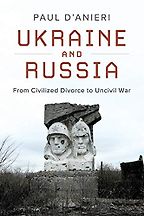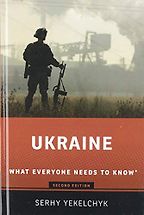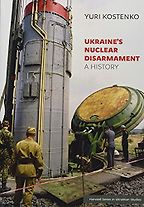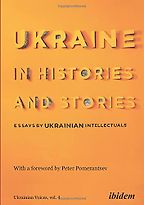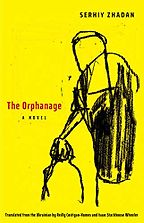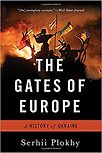Before we get to the books could you explain what, in your view, the conflict between Russia and the Ukraine is about?
It has been framed again and again in terms of Russia and NATO. There are some elements of the conflict that are about Russia and NATO, but there are also deeper roots. It is a situation that probably could be recognized anywhere in the world—because what we see is the process of disintegration of one of the last world empires. The Russian Empire started to fall apart when the Austro-Hungarian, the Ottoman and other empires were falling apart. The Bolsheviks held it together, but it still fell apart in 1991, almost overnight. Everyone was surprised. It was a miracle that there was no major war or bloodshed. Now we realize that the war was just postponed. In that sense, it looks terrible. But it’s also a very familiar situation for many countries in the world, who also went through a war for independence. It’s not unheard of.
It is complicated by the fact that in terms of Russians and Ukrainians, there are unresolved issues of identity and nation formation, of contested history. For example, Russians believe that they come from Kyiv (‘Kiev’ in Russian), which happens, today, to be the capital of an independent state, Ukraine. Putin wrote an article on “the historical unity of Russians and Ukrainians.” How many presidents going into war write that kind of article, and make those arguments? It’s an attempt to delegitimize the Ukrainian claim for statehood. If we are historically the same people, what right do you have to have a state? You have none! That normally doesn’t happen with the disintegration of empires. The British never claimed that they somehow came from Delhi, or vice versa. But you do see that with Russia and Ukraine.
So those are the deep roots and overall structure of the conflict. With the end of the Cold War, the Soviet Union fell apart. It was not a hot war, but it was a war that was lost by Moscow economically, geo-strategically etc. Now there is an attempt to get the empire back together as a belt of dependencies. Russia tried through economic means, through political means, and now we’re at the war stage. It’s the last instrument that Russia has in its hands.
Ukraine is important because it’s the second-largest post-Soviet republic. If Ukraine resists successfully, that puts in question the Russian claim for the rest of the post-Soviet space. It puts in question the attempt of Moscow to somehow recreate not the Soviet Union—no one wants that, that was an expensive imperial project—but establish an effective sphere of influence. Without the second largest part you would have a huge hole in the entire structure.
So, what is being presented and debated in the media is Russia—NATO relations. Those relations are important, but they are just one layer at the very top of all these many, many, many other political, historical and cultural layers that define the current crisis.
Before speaking with you, I was looking at a New York Times map of where the Russian troops are, and I could see them in Belarus and Moldova. Earlier in the year, Russian troops were invited to intervene in Kazakhstan. It seems like quite a few ex-Soviet countries are quite happy to stay in the Russian sphere of influence. I guess the problem for Ukraine is that, since 2013—or maybe earlier, 2004—it’s been trying to go down a different route?
You’re absolutely right. The Soviet Union fell apart on the issue of Ukraine. The first to raise the banner of independence were the Baltic states, but they’re small countries and they’re not Slavic. The Ukrainian referendum of December 1991 didn’t ask the question of what one wanted to do with the Soviet Union, the referendum was about Ukraine only: ‘Do you want Ukraine to be independent?’ But once more than 90% of Ukrainians responded in the affirmative, the USSR was gone within a week. The Central Asian republics were really pushed out of the Soviet Union because Russia was not interested in a union with them without Ukraine. That’s the beginning of the most recent part of the story: the Soviet Union fell on the issue of Ukraine and now, if there are to be effective Russian economic, military and other spheres of influence, Ukraine is essential, like it was back in 1991.
Let’s talk about the books you’ve chosen, and maybe you can say a bit about each of them and what they bring to the picture. The first one on your list is Ukraine and Russia: From Civilized Divorce to Uncivil War by Paul D’Anieri, who is a political scientist. I think he’s a specialist on this relationship, is that right?
In terms of books, this is Paul D’Anieri’s first one that deals with Ukraine-Russia relations. Before that, he studied the internal processes in Ukraine and to a degree in Russia—and that’s what he brings to the table. This book is more than just international relations theory or diplomatic history; Paul D’Anieri actually knows a lot about both countries.
He starts in the late the 1980s and goes up to when the book was published in 2019, so when the war had already started, and the first stage of the war had passed. His argument is basically twofold. Firstly, that the roots of this story are in the history of the disintegration of the Soviet Union and how it fell apart. He stresses the importance of Ukraine in that process, something I was just talking about.
“What we see is the process of disintegration of one of the last world empires”
His other big argument is that the war became almost inevitable because of a different political track chosen by Ukraine and Russia, in particular the issue of nation-building and the creation and consolidation of state in Ukraine. Ukraine becomes a democratic state; Russia moves in an authoritarian direction. This automatically puts Russia’s relations with Europe in a difficult position and issues of security become very important. He is very good at documenting and providing a chronology of how matters of security have affected Russian-Ukrainian relations since the 1990s, into the 2000s and the arrival of Putin and after. He gives a good explanation of the war and its background, not looking for some sensationalist explanations or looking at the personalities, but at the structural reasons.
He is a political scientist, and the book is very well organized and well written. It explains a lot about the two countries and their political development, the choices that were made in both cases, and how those choices eventually led to this clash, the current confrontation.
Yes, because we may talk foreign policy, but if you look at how leaders act, it’s almost always to do with domestic politics.
Yes, indeed—and he really brings this point home.
Let’s move on to Ukraine: What Everyone Needs to Know by Serhy Yekelchyk, who is a Ukrainian historian based in Canada. Are you recommending this as the best introductory book?
Exactly. It’s part of an Oxford University Press series, ‘What Everyone (supposedly) Needs to Know.’ The first edition appeared in 2015 and was called The Conflict in Ukraine. It was done almost like a catechism: he collected all these questions that were out there and explained what they meant. The book was exceptionally important given that the war that began in Ukraine and still goes on is a hybrid one: it includes disinformation, false narratives, false flag operations, and so on and so forth. The book did a very good job of explaining whatever claims there were in the media. Was the Ukrainian Maidan protest fascist? What was happening with Crimea? What is the attitude of the population of Donbas?
This is a revised and new edition, which also, according to the title, is a broader book. If people are interested in the subject, that’s where I suggest they start.
Get the weekly Five Books newsletter
His argument in explaining the war goes against the Kremlin’s narrative. In the media, one can read that Ukraine is in a civil war, that the country is divided between east and west, and these people speak Russian, and these people speak Ukrainian. He argues that this is not an issue. Yes, the languages are different, but Ukrainians have mobilized across linguistic lines. A good many of the soldiers who are fighting today on the front speak Russian. The Russian language doesn’t automatically mean Russian identity and loyalty to Russia.
In the 2020 edition, he brings in more recent developments, including the Trump impeachment trial, Paul Manafort and the claims about Ukrainian interference in the American elections. It’s a book that deals with all these issues and arguments that have appeared in the media since the start of the war.
The book is for a broad audience. He recently advertised the new edition saying, ‘the book is out there. It is not for my Facebook friends because you probably know all of it, but please recommend it to your friends.’ It’s an ABC of the current conflict and the war, written by a very good historian.
Let’s go on to Ukraine’s Nuclear Disarmament by Yuriy Kostenko. He’s the Ukrainian politician who was actually involved in the negotiations that led to the Budapest Memorandum, when Ukraine gave up the third biggest nuclear arsenal in the world. Tell me about the book and how it fits in.
At the start of the war, Russia violated a lot of treaties. One of the key ones was the Budapest Memorandum, signed in December 1994 with the United States, United Kingdom, Russia and Ukraine. There were also separate agreements that were signed with Kazakhstan and with Belarus. According to the agreements, these republics gave up the nuclear arsenals that they had inherited from the Soviet Union in exchange for, not guarantees, but ‘assurances’ by the three other powers of their sovereignty, the inviolability of their borders and so on. In 2014, Russia, one of the countries that gave those assurances—and to whom Ukraine transferred its nuclear arsenal—violated its territorial integrity and occupied Crimea.
It is in that context that Kostenko writes this book, which is half memoir, half based on all the documents that he accumulated. It’s a really, really interesting story, almost unknown in the West. Ukraine was very reluctant to give up its nuclear arsenal, over which it had physical, but not operational control. Kazakhstan and Belarus were much more agreeable. Once again, Ukraine was a troublemaker, if you look at it from a Russian perspective. But everybody took the position that it was a good thing, a great success of denuclearization.
“It was a miracle there was no major war or bloodshed”
Kostenko provides a different perspective. It’s the first work in English with so much detail that goes against the mainstream, Western interpretation of that story. His argument is not that Ukraine should have kept nuclear weapons, but that Ukrainians were forced to give them up without getting proper guarantees of the country’s independence or adequate financial compensation. Nuclear weapons were Ukraine’s security, and they gave it up because the US and Russia were working together.
This is a perspective that has received very little attention in the West and it is especially interesting because it comes from the mouth of someone who was right there, in the middle of the denuclearization process. You could also say, ‘Thank God the war now is not nuclear—because it could have been, if there had been no Budapest Memorandum.’ But one way or another, our understanding of the Budapest Memorandum and what is happening today is absolutely incomplete without this very important book.
Is he suggesting Ukraine should maybe have kept its nuclear weapons?
No, and that wasn’t his position in the 1990s. He was involved as Minister of Environmental Protection and Nuclear Safety; he also dealt with Chernobyl. What he is saying is that Ukraine was cheated out of its nukes. The price was wrong. The price should have been either membership in NATO or something else that was actually meaningful—that would save Ukraine from Russian aggression. What has happened to Ukraine since it was disarmed has and will have a negative impact on the global story of denuclearization. Countries are going to think twice next time someone comes along proposing to give them a piece of paper in exchange for their nuclear weapons. It’s a huge disincentive to denuclearize. That’s the global importance of this story, beyond just the current crisis.
Let’s go on to Ukraine in Histories and Stories: Essays by Ukrainian Intellectuals. Tell me about this book.
This book, in a way, is on a level with Yekelchyk’s, in a sense that it is an introduction to Ukraine, but it’s an introduction using Ukrainian voices. The foreword is by Peter Pomerantsev and there are essays by other expats (I’m also one of the authors). But mostly the essays are by Ukrainian intellectuals living in Ukraine. They talk about their country, about stereotypes, about mythology, about history, about literature. It’s an introduction to Ukraine for the people who read not only nonfiction but also fiction, who are interested in what the local cultural and academic scene looks like.
What do Ukrainian philosophers think about their country? Or the writers? A lot of the contributors are writers, like Andrey Kurkov. If a person is at least a little bit known in the West, they’ll be in there. There’s Volodymyr Rafeenko, one of the best new Ukrainian writers. There’s an essay by Yuri Andrukhovych, one of the most recognizable names in Ukrainian literature. There is a piece by Alim Aliev on “Ukraine and Crimean Tatars,” another important issue.
This book is for people who are interested not just in politics, but in the cultural scene, who have maybe read some of the Ukrainian authors that have been translated and want to know a little bit more about the country.
And does the book deal with how people feel about Russia and the relationship with Russia?
It’s all about that in one way or another. It’s about Ukrainian identity and what it means and how different or not different it is from Russian. The people who write these essays are all bilingual in a sense. Andrey Kurkov has published a couple of books in Ukrainian, but he is basically a Russian language writer. For Crimean Tatars, the younger generation speaks and writes Ukrainian, but for the older generation, it’s Russian. The Polish Ukrainian connection is also represented in the book, in a piece by Ola Hnatiuk.
So is it a combination of fiction and nonfiction?
No, these are all essays. Andriy Kulakov writes the introduction, “Tabula rasa, or How to Find A Ukrainian Terra Incognita.” A historian, Yaroslav Hrytsak, writes “Ukraine: A Brief but Global History of Ukrainian Bread.” They interviewed me about Cossack identity in the Ukraine and Yuri Andrukhovych on “Ukrainian Culture and Literature.” There is also an essay called “Steppe, Empire, and Cruelty” by Volodymyr Yermolenko, who is a very good philosopher. Larysa Denysenko, who is a lawyer and activist, writes about “Majority as a Minority”. “Gaining a Motherland” by Vakhtang Kebuladze, a philosopher, is all about attitudes toward the Soviet past, the current war and where you belong. There is an essay called “Donbas–Ukraine, a Life Journey” by Volodymyr Rafeenko, who is one of the refugees from Donbas. The last one is called “Insecure Security of Ukraine” by Hanna Shelest, an essayistic take on the current security situation—or lack of it.
Lastly, you’ve chosen a work of fiction, The Orphanage: A Novel by Serhiy Zhadan. Is he one of the most famous Ukrainian novelists?
Yes, in Ukraine he is probably the leading novelist; outside of Ukraine, I think Andrey Kurkov is better known. Both Kurkov and Zhadan wrote on this current war. Andrey Kurkov’s book is Grey Bees. I didn’t include it because I want to read it, but I haven’t yet.
The Orphanage is an extremely interesting book. Serhiy Zhadan comes from Eastern Ukraine and during Maidan was taking part in the clashes in the second-largest Ukrainian city, Kharkiv, which is now under the threat of possible attack. He is a multi-talented person: he has his own band and sings, he writes novels and poems, he draws. To me, it’s a brave book because it’s talking about the things that one was not supposed to talk about during the war. The war says, ‘This is us, and we are in the right. We’re the heroes, and the other guys are everything that is the opposite of that.’ And certainly we are Ukrainians, Ukrainian patriots.
But in the novel he writes about a guy, Pasha, who has this post-Soviet identity. He is ethnically Ukrainian but is not really Ukrainian or Russian. Exclusive identity is not his. That’s very much the story of the Donbas, which is now outside of Ukrainian control, and many parts of Eastern Ukraine as well. The national identities are not really formulated.
Five Books interviews are expensive to produce. If you're enjoying this interview, please support us by donating a small amount.
Pasha is a teacher and is not taking sides in the conflict, in the war. But he has a nephew who happens to be on the other side of the dividing line, in the area controlled by separatists. He feels he has to go and get the nephew and bring him back to the family. In the process of travelling there and travelling back, he realizes where his home is. That is also a big, important thing: the war shapes Ukraine and Ukrainian identity. It leads to attachment to a nation that maybe wasn’t there before in those eastern parts of Ukraine. It’s a story of discovering where you belong, on which side of that divide.
Again, I was saying that it was a brave book, because if you read about this guy, you sympathize with him. The novel is a kind of explanation of this blurred identity that is neither here nor there and which, of course, opens up all these possibilities for manipulation. The novel is also very well done. It reads well. It’s almost a photographic portrayal and presentation of this society where the war is taking place, without an attempt to somehow ideologically paint it one way or another, or pretend that it is not what it is not. In that sense, it is a very honest book as well.
I read the first part, where he gets into trouble because he’s avoiding listening to the news. He doesn’t want to hear about what’s going on, he just wants to go about his day.
This is another part of the coping mechanism in Ukraine, that people just stopped listening or watching. It’s a form of denial, but it’s also a form of coping with the situation. Will Putin attack today or not? Or maybe tomorrow? A person can’t live like that for four or five or six months.
Right now, in Ukraine, I understand there is no panic. Everything that is normally in the stores, is there. People are not stocking up on toilet paper, like we did when Covid came. Everything is in abundance. The only thing that is not there are hunting weapons and guns that people can buy. That’s the only thing there’s been a run on. It’s interesting, the way society reacts. For whatever reason, they’re not stocking up on anything except the weapons, which means they want to stay and resist. They want to be able to protect themselves.
Do you understand what Putin hopes to achieve in Ukraine with the current buildup? It’s slightly confusing to me because I’d always been led to believe surprise was a key element in military strategy. If he was going to invade, shouldn’t he already have done so?
The point is to finish unfinished business from 2014. His goal is either to make Ukraine pro-Russian or dismember it. He didn’t succeed in 2014. He grabbed part of the Ukrainian territory but it mobilized the rest against Russia. In Ukraine, the number of people who want to join NATO went up by three times. Ukraine became closer to the West: conducting joint military exercises with NATO and so on and so forth. It’s the absolute opposite of what he wanted to achieve. So the plan now is to come back and threaten the Ukrainian government, to create internal crisis, to grab more territory—basically, the goals are the same.
It’s a war in which 13,000 people have already died since 2014, is that right?
Yes, between 13 and 14,000. Also, in these kinds of wars, it’s not the military who are the most vulnerable, but the civil population. It’s the average citizens who suffer from the bombings and airstrikes the most.
Five Books aims to keep its book recommendations and interviews up to date. If you are the interviewee and would like to update your choice of books (or even just what you say about them) please email us at [email protected]
